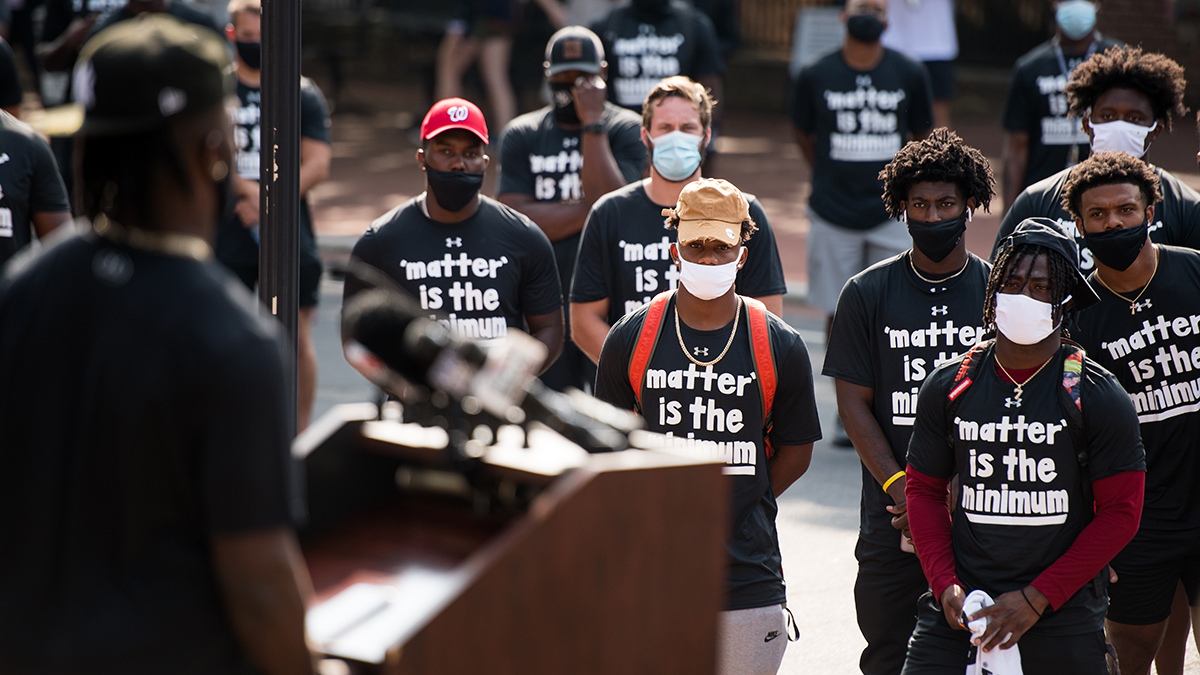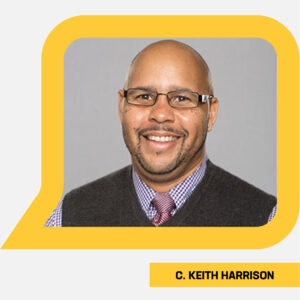GSM Live Insights: The Reset of College Sport
“I don’t think everyone can be on the frontlines, but everyone’s got to get off of the sidelines.” -Dr. Richard Lapchick
In college sports, football may ‘reign supreme’ in popularity, but it is behind the curve when it comes to diversity at its top tier coaching positions. Global Sport Matters Live: The Reset of College Sport brought experts together to discuss the newest Field Study report from the Global Sport Institute, the barriers to upward mobility for coaches of Color and the reset moment for college sports. Jump to the sections below to see the top insights from each speaker at the event.

“How is it that in this day, the greatest gain is with White coaches?”
In the last decade, the greatest gains in college football head coaching jobs have been for White men. Findings from the Global Sport Institute’s recent field study comparing White coaches and coaches of Color by experience, win/loss record, as well as conference region show that, all in all, opportunities for coaches of Color still come up short.
“Why is it that the Black athletes who had all of the visibility can’t start out at any level and have success?”
Examining how the data on colleges compares to the professional level, Dr. C. Keith Harrison makes the important note that when we talk about the similarities versus differences, at the college or professional level, the similarities are race and barriers to upward mobility.
“We are often looked at as an experiment.”
Dr. Fitz Hill reflects on his experience as the first Black Head Football Coach of San Jose State University and then as President of Arkansas Baptist College. Boosters have large sway because of the dollars they bring, but the role of the college president has to remain intentional to ensure diversity. Hill says, “Oftentimes we are affirmed and validated by being called ‘the first’ but when I think about it…they’ve got to be comfortable with you.”
“I think we have an opportunity to do more things than we ever could before and if we don’t seize the moment, shame on us.”
His Racial and Gender Report Cards have served as a resource to advocate for real change at the highest levels of sport. Dr. Richard Lapchick reminds us that although progress is slow, it is always worth the fight; that there is power at every level, and that athlete activism has turned a corner in this great awakening to become a vital catalyst for reform.
“It’s important for student athletes, specifically of Color, to mobilize, use your voice and your power. Now is the time.”
Ten years ago Sam Sachs pushed Oregon to adopt a ruling that ensures a more diverse and even playing field when it came to hiring practices. Today, with his organization, The No Hate Zone, he continues to pressure the National Collegiate Athletic Association (NCAA) to adopt a ruling nationwide and calls on student athletes to use their voice to create change.
Recommended reading mentioned in the conversation:
- Five Minutes to Midnight: Race and Sport in America in the 1990s by Richard Lapchick
- Crackback! How College Football Blindsides the Hopes of Black Coaches by Fitz Hill
- Derrick Bell and the Ideology of Racial Reform: Will We Ever Be Saved? by Richard Delgado
(Derrick Bell’s work “The Chronicle of the DeVine Gift” was not available; a Review Essay on Bell’s work from Yale Law Journal is linked above)
Other recommended reading on race, sport and society:
- Smashing Barriers: Race and Sport in the New Millennium by Richard Lapchick
- Broken Promises: Racism in American Sports by Richard Lapchick
- Never Before, Never Again: The Stirring Autobiography of Eddie Robinson by Richard Lapchick
- In Black and White: Race and Sports in America by Kenneth L. Shropshire
- The Miseducation of the Student Athlete: How to Fix College Sports by Kenneth L. Shropshire
- Sport Matters: Leadership, Power and the Quest for Respect in Sports by Kenneth L. Shropshire
- Black Men Can’t Shoot by Scott N. Brooks
Read the full Field Study we discussed during this event:
In college sports football may ‘reign supreme’ in popularity, but it is behind the curve when it comes to diversity at its top tier coaching positions. The newest field study report to come out of the Global Sport Institute at Arizona State University shows the stark, yet unsurprising, reality of NCAA Power 5 conference Division 1 head coaches over the past decade – who is and isn’t given the opportunity to hold the position.
As college sports return, student athletes, athletic departments, academic leadership, and fans from around the country are anxious to see how this unconventional season will play out. The world is almost unrecognizable from last year and there are new questions to be answered in regards to safe sport in a pandemic as well as the impact of systemic racism on athletics, educational institutions, and every aspect of life. Dr. Fitz Hill, Dr. Keith Harrison, Dr. Richard Lapchick, Dr. Karen Gallagher, and Sam Sachs join Global Sport Institute CEO Kenneth L. Shropshire in a captivating discussion about how the reset of college sport has the potential for much needed improvements across all divisions and programs.






